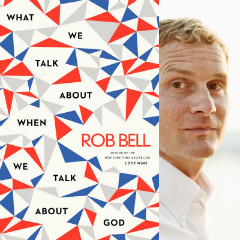
Any book of theology that starts with a epigraph by Tom Waits is arguably worth looking at. Such is Rob Bell’s What We Talk About When We Talk About God.
Since the 2011 publication of Love Wins, Bell’s name has doubled as a lighting rod, the controversy having merely cooled, not diminished. I have no interest in revisiting that here. Nor do I have any interest in writing a negative review of his newest, aspects of which certainly could use the discerning squint of a jeweler’s eye.
Here I want rather to highlight three praiseworthy facets I encounter when I read What We Talk About When We Talk About God.
1. I read about transcendence
I’ve written here before about the materialist, naturalist reduction by which our world today is widely understood. I should say widely misunderstood. But Bell, writing for the benefit of both religious and irreligious skeptics, reminds us that naturalism can only take us so far.
“Science does an excellent job of telling me why I don’t have a tail,” he says, “but it can’t explain why I find that interesting” (75). Delving into quantum mechanics and more, he offers a picture of the world in which mystery and majesty possess more sway than we might otherwise realize at first glance. If only we would look longer.
“[W]hen people object to the idea of God, to the idea that there is more beyond our tangible, provable-with-hard-evidence observations and experiences of the world, they aren’t taking the entire world into account,” he writes (49). When you do that, faith becomes not only reasonable; it becomes natural.
But faith in what?
2. I read about God’s love
Bell doesn’t draw lines as clear as a creed. He offers at least one reason for this: “Whatever we say about God always rests within the larger reality of what we can’t say. . . ” (90). While some might fault him here, the apophatic approach has at least one virtue. It does not overspeak; it does not say more than can be said.
What Bell does say positively is that God stands with us an for us. He points us to the incarnation to get the fuller picture:
The Christmas story . . . is a deeply subversive account, coming in just under the radar, giving us a picture of a God who is not distant or detached or indifferent to our pain or uninterested in our condition or uninvolved in our very real struggles in this world, but instead is present among us in Jesus to teach us and help us and suffer with us and give us hope because this God is for us.
So when we talk about Jesus being divine and human, what we’re saying is that Jesus in a unique, singular, and historic way, shows us what God is like. (131-132)
He continues:
Gospel is the shocking, provocative, revolutionary, subversive, counterintuitive good news that in your moments of greatest despair, failure, sin, weakness, losing, failing, frustration, inability, helplessness, wandering, and falling short, God meets you there — right there — right exactly there — in that place, and announces, I am on your side. (135-136)
We can trust this is so because God in Christ emptied himself and took our humanity down to the last jot of DNA and suffered alongside us (Phil 2:5-8, Heb 2.14-18). This willingness to humiliate himself and join himself to our suffering is evidence of God’s love for us. You know how it goes: “For God so loved the world. . . .”
3. I read about life’s sacramentality
Another thing I read about when I read Rob Bell is how God fills this world he loves with his energies, with his presence.
If all things consist in God (Col 1.16-17), then God is in all things. The Orthodox say of the Holy Spirit that he is “everywhere present and fills all things” (Prayer to the Holy Spirit). All of creation contains within it the possibility of communion with God, of connection, of conveying his grace. Bread, as Bell says, is never just bread, nor wine merely wine.
So, he says, “When we talk about God, we’re talking about the Jesus who comes to reunite and reconnect us with the sacred depth, holiness, significance, and meaning of every day” (185).
This awareness of life’s sacramentality offers a way forward for Bell and anyone who appreciates his approach in What We Talk About When We Talk About God. When discussing the eucharist, Bell mentions in his notes Ephraim the Syrian, as well as the book by Orthodox priest Stephen Freeman, Everywhere Present. Further exploration into the Orthodox understanding of the sacraments — perhaps starting with (or rereading?) Alexander Schmemann’s For the Life of the World — could provide helpful direction on the journey.
Bell has a useful discussion, for instance, about how our “secrets, sins, doubts, regrets, and crippling fears” can divide our hearts and rend our spirits and how the Holy Spirit brings us to wholeness again (187-192). It could only be improved by elaborating on the sacrament of confession.
While I do have reservations about and criticisms of the book, I think these three facets alone make it worthy of serious consideration.












